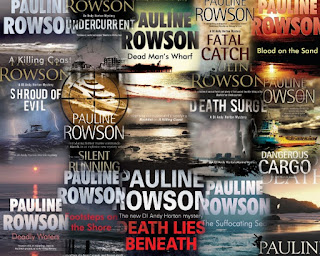Fiction turns to fact
Many crime writers take their themes for their novels from real life incidences and when I wrote In Cold Daylight it was based on the tragic true story of a group of fire fighters from one watch in Portsmouth all contracting cancer. My husband was a fire fighter at Portsmouth. Many believed their cancer was contracted from exposure to hazardous chemicals in the line of duty but this has never been fully investigated. I decided to blend what I heard into a dramatic fictional plot, unaware then that a major International disaster on a massive scale (9/11) would be the catalyst to spark studies in the USA into this controversial area.
Since writing In Cold Daylight what was speculation amongst the fire fighters has become fact in the States, at least. The UK still has to wake up to this! The most recent research from the States confirms that fire fighters are at greatly increased risk from work-related cancer. This was first highlighted in a study by the University of Cincinnati, and most recently in research reported in the American Journal of Industrial Medicine, May 2008.
After a three year study prompted by 9/11, research from the University of Cincinnati found that rates of testicular cancer were a hundred per cent higher and prostate cancer twenty-eight percent higher among fire-fighters. In addition, the researchers also discovered a fifty percent increase in non-Hodgkin's lymphoma and multiple myeloma. Researchers say fire-fighters are exposed to many compounds designated as carcinogens, or cancer-causing agents including benzene, chloroform, soot, styrene and formaldehyde. Of course they are. These can be inhaled or absorbed through the skin at the scene of a fire.
In the most recent study, the researcher combed through nearly two decades' worth of data from the Massachusetts cancer registry. Between 1986 and 2003, the registry recorded 2,125 cancer diagnoses among professional male fire fighters. They found that, compared with men in other occupations, fire fighters had nearly twice the risk of brain cancer and a thirty six percent higher risk of colon cancer. They also showed higher risks of bladder cancer, kidney cancer and Hodgkin's lymphoma. All these facts so far have gone unrecognised in the UK, yet are raising serious questions in America, Canada and Australia.
The evidence is clear that fire fighters suffer from certain cancers at a higher rate than others. Fire fighters spend a career facing toxic dangers, in the name of protecting the public. It is an occupational risk and should be recognised. When a fire fighter dies from a cancer identified as occupational, their families need and deserve appropriate compensation. Although In Cold Daylight is fiction there is a strong central message in the novel and readers might like to ask can this really be happening? I'm hoping that we can get the debate going in the UK, but at the moment no one seems interested!
Since writing In Cold Daylight what was speculation amongst the fire fighters has become fact in the States, at least. The UK still has to wake up to this! The most recent research from the States confirms that fire fighters are at greatly increased risk from work-related cancer. This was first highlighted in a study by the University of Cincinnati, and most recently in research reported in the American Journal of Industrial Medicine, May 2008.
After a three year study prompted by 9/11, research from the University of Cincinnati found that rates of testicular cancer were a hundred per cent higher and prostate cancer twenty-eight percent higher among fire-fighters. In addition, the researchers also discovered a fifty percent increase in non-Hodgkin's lymphoma and multiple myeloma. Researchers say fire-fighters are exposed to many compounds designated as carcinogens, or cancer-causing agents including benzene, chloroform, soot, styrene and formaldehyde. Of course they are. These can be inhaled or absorbed through the skin at the scene of a fire.
In the most recent study, the researcher combed through nearly two decades' worth of data from the Massachusetts cancer registry. Between 1986 and 2003, the registry recorded 2,125 cancer diagnoses among professional male fire fighters. They found that, compared with men in other occupations, fire fighters had nearly twice the risk of brain cancer and a thirty six percent higher risk of colon cancer. They also showed higher risks of bladder cancer, kidney cancer and Hodgkin's lymphoma. All these facts so far have gone unrecognised in the UK, yet are raising serious questions in America, Canada and Australia.
The evidence is clear that fire fighters suffer from certain cancers at a higher rate than others. Fire fighters spend a career facing toxic dangers, in the name of protecting the public. It is an occupational risk and should be recognised. When a fire fighter dies from a cancer identified as occupational, their families need and deserve appropriate compensation. Although In Cold Daylight is fiction there is a strong central message in the novel and readers might like to ask can this really be happening? I'm hoping that we can get the debate going in the UK, but at the moment no one seems interested!

Comments